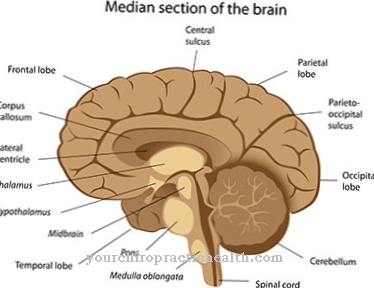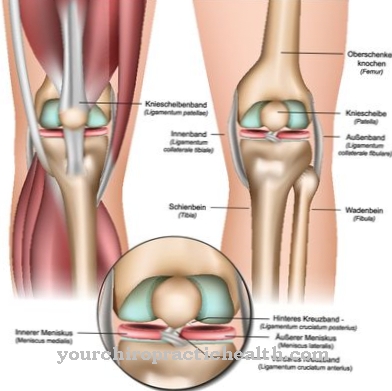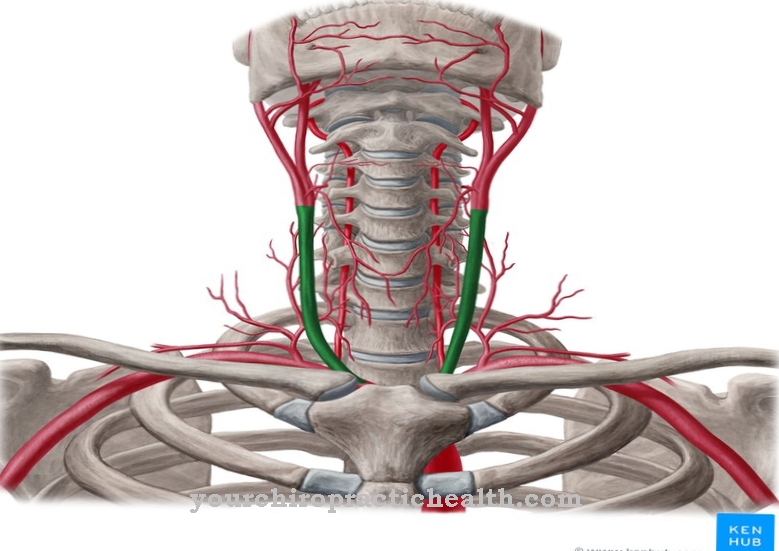A metabolic alkalosis is a shift in the pH value in the blood and extracellular tissue to values above 7.45. The reason for this shift is primarily an increase in the bicarbonate concentration, either due to the accumulation of bicarbonate via the kidneys or due to the loss of acidic gastric juice in the event of severe or chronic vomiting.
What is Metabolic Alkalosis?

© Yaruniv-Studio - stock.adobe.com
In the metabolic alkalosis the pH of the body gets messed up, which can have devastating effects on the functioning of the metabolism. The word "metabolic" indicates that the cause of this pH shift is also to be found in the metabolism. The counterpart to this would be respiratory alkalosis, which is caused by breathing.
causes
The role of the kidney is a crucial factor in the development of the metabolic alkalosis: Bicarbonate is an important buffer system in the blood, which has the sole task of regulating the pH value. To achieve this, a bicarbonate ion can combine with a proton ("acid") and remove it from circulation. It is then converted into carbon dioxide and water, the carbon dioxide molecule can be exhaled through the lungs and is thus finally excreted. With the help of bicarbonate, acid can be withdrawn from circulation, which is constantly generated in our body, for example during muscle work.
In order to remove bicarbonate from circulation, the kidney is required. This filters out large quantities of bicarbonate from the blood and then only fetches as much bicarbonate back into the blood as is needed for buffering in its widely branched collecting pipe system. If this complex, regulated system is disrupted, for example by taking diuretics, i.e. water tablets, it can easily happen that too little bicarbonate is excreted and consequently changes the pH value of the blood by binding acid to alkaline - this is metabolic alkalosis originated.
In addition to the side effects of diuretic therapy as one of the main causes of metabolic alkalosis, shifts in the potassium and chloride levels are also possible, which are also connected to the acid-base balance of the body via the kidneys.
Since chloride and bicarbonate are both negatively charged ions, they can easily be exchanged with each other via the cell wall - if the body lacks chloride, it can replace it with bicarbonate molecules for a short time, which then ensures electrical equality, but also leads to alkalosis. Chronic vomiting is a possible cause of this problem: gastric juice consists of hydrochloric acid, i.e. protons and chloride; Acid is thus lost directly to the body and, indirectly, thanks to the lack of chloride, bicarbonate is also saved in the kidneys and floods the metabolism.
Potassium, in turn, is exchanged for protons, so diseases with a potassium deficiency can also lead to metabolic alkalosis. Hormonal disorders (mineralocorticoid excess) can be the cause here. Conversely, metabolic alkalosis also leads to an increased shift of potassium into the cells in exchange for acidic protons.
Symptoms, ailments & signs
The clinical picture of metabolic alkalosis is characterized by a drop in blood pressure, which is characterized, among other things, by weakness, confusion and abnormal sensations of the skin. Those affected feel a strong feeling of discomfort, which occurs suddenly and becomes stronger as the disease progresses. As a result of the imbalance in pH, cramps and difficulty breathing occur.
In severe cases, life-threatening respiratory depression occurs. Metabolic alkalosis can also manifest itself in the form of apathy, visual disturbances, ringing in the ears, feeling hot, and cardiac arrhythmias. The clearest sign is the characteristic position of the hands, which are cramped and bent slightly forward.
During the medical examination, a potassium deficiency can be determined. If not treated promptly, other health problems can arise. There is a risk that symptoms of deficiency (for example, fatigue and dizziness) arise. In addition, the cramps increase in intensity and sometimes cause severe pain in the person concerned.
If the metabolic alkalosis is left untreated, it can lead to heart failure. Permanent damage to the internal organs and blood vessels cannot be ruled out. With early treatment, however, serious complications like these can be reliably avoided. The cramps usually subside within a few days to weeks.
Diagnosis & course
The symptoms of the metabolic alkalosis is mostly determined by the low potassium level: abnormal sensations on the skin, muscle weakness and dangerous cardiac arrhythmias can occur. As with respiratory alkalosis, cramps and the typical "paw position" of the hands can also occur. Overall, severe metabolic alkaloses are quite rare and are therefore often overlooked.
A simple withdrawal of capillate blood to carry out a blood gas analysis (BGA) can reveal the problem: measurements of the pH value and bicarbonate concentration unmistakably indicate a metabolic alkalosis, while potassium and chloride values can provide information about the cause.
Complications
In the worst case, this complaint can lead to the death of the patent. However, this occurs very rarely and can be avoided with prompt and early treatment. Those affected themselves suffer from severe breathing difficulties and a potassium deficiency. The lack of potassium has a negative impact on the patient's health.
A general weakness develops, the patient feels noticeably exhausted. Resilience also drops significantly and muscle spasms occur. These cramps can lead to severe pain and uncomfortable feelings and thus significantly reduce the patient's quality of life. Furthermore, confusion also occurs, so that normal thinking and acting is usually no longer possible for the person concerned.
Without treatment, heart problems can also occur, leading to cardiac death. Treatment for this disease can be through IV fluids and other drugs or supplements. There are no complications and the symptoms can be limited relatively well. If the treatment is successful, the life expectancy of the person affected is not reduced.
When should you go to the doctor?
Confusion, general weakness and a decrease in normal resilience are signs of an existing irregularity. If the symptoms persist or if they increase in intensity, a doctor is required. If abnormal sensations or perception disorders of the skin occur, this is considered an indication of an existing disorder. If there is a tingling sensation on the skin, an uncomfortable feeling to the touch or an oversensitivity, a doctor's visit is advisable. A doctor should be consulted if there is a disturbance of the heart rhythm, a feeling of excessive heat development in the body or sweating.
Since metabolic alkalosis, if left untreated, can lead to premature death in severe cases, a medical check-up should take place as soon as the first signs and symptoms appear. Hardened muscles, a reduction in muscle strength or a general feeling of pain in the organism must be examined and treated. Apathy, fatigue, functional disorders and problems with sight or hearing should also be clarified by a doctor.
Noises in the ears, breathing and heart sounds are worrying and should be treated immediately. A possible heart failure must be prevented as soon as possible. Cramps in the hands or abnormal hand posture are signs of illness. If the hands are repeatedly bent slightly forward in everyday life, this is an indication of metabolic alkalosis.
Treatment & Therapy
For the therapy of metabolic alkalosis the distinction between the different forms is crucial:
If there is a lack of chloride and blood volume (e.g. after vomiting), the administration of sodium or potassium chloride as an infusion by a doctor is sufficient to stabilize the acid-base balance again.
If diuretic therapy is used, the drug in question should be discontinued or a so-called potassium-sparing diuretic should be added. If there are underlying disorders of the hormone metabolism, further drug therapy and sometimes surgery is necessary.
Outlook & forecast
With rapid and good medical care, the prognosis for metabolic alkalosis is favorable. Through the administration of medication, the existing symptoms are alleviated. The pH level is regulated and an improvement in general health occurs. As soon as there are side effects of the prescribed preparations, these are replaced by alternative products. Nevertheless, a chronic or unfavorable course of the disease can develop.
If left untreated, metabolic alkalosis can lead to premature death. Health irregularities are increasing and at the same time there is a reduced quality of life. Expect severe pain, internal weakness, cognitive changes, and cramps. If the patient refuses to work with a doctor, his life expectancy is significantly reduced. Various complications can also arise at an advanced stage of the disease. Nevertheless, the survival of the person concerned is assured in these cases.
If the drug therapy does not work as desired, surgical intervention is carried out. This is associated with risks, but it is the only way to help improve health if the disease is advanced or the symptoms become chronic. In most cases, long-term therapy is necessary to achieve permanent relief from the symptoms. The pH value must be checked at regular intervals and corrective measures are necessary if necessary.
prevention
Prophylactic measures can be taken to avoid the sometimes severe consequences of a metabolic alkalosis only recommend regular monitoring of diuretic therapy. In the case of severe or permanent vomiting, a BGA should also be carried out in order to identify disturbances in the acid-base balance in good time and to be able to take countermeasures.
Aftercare
In most cases, direct follow-up care is not possible or necessary in metabolic alkalosis. Sufferers of this disease are dependent on treatment in order to avoid further complaints and complications. If the alkalosis is not treated, the patient will die in most cases.
For this reason, early diagnosis and treatment of metabolic alkalosis have a very positive effect on the further course of the disease. If the disease is treated by an operation, the patient must rest after such an operation and take care of his body. You should therefore refrain from strenuous activities or sporting activities.
Potassium can also be taken to relieve the symptoms of alkalosis. Patients should ensure that they are taken regularly. In the event that the alkalosis was triggered by a drug, it is advisable to discontinue this drug. Only then can the disease be fully treated.
However, stopping medication should only be done after consulting a doctor. In some cases, the disease also reduces the patient's life expectancy. However, this depends heavily on the underlying disease.
You can do that yourself
If there is a metabolic alkalosis, it is usually sufficient to discontinue the drug responsible. Further self-help measures focus on alleviating the individual symptoms.
A general weakness can be counteracted by exercising in the fresh air. Especially in the first few days after the treatment, the immune system has to get going again, which is why physical activity is particularly recommended here. Treatment is not necessarily required for cramps and confusion. The symptoms usually go away on their own as soon as the alkalosis has been overcome. This process can be accelerated by rest and bed rest. Those affected should sleep a lot in the acute phase and, ideally, take sick leave for two to three days.
In addition, some resources from the budget and nature can be used. Preparations with magnesium and soothing teas (e.g. chamomile or lemon balm) help with cramps. Homeopathy recommends the remedies Cuprum metallicum, Magnesium phosphoricum and Cina, among others. If you are confused or have difficulty concentrating, warm infusions or woodruff tea help. Belladonna, Glonoinum, and Rhus Toxicodendron are effective homeopathic alternatives.

















.jpg)







.jpg)


